
 |
||||||
|
GAY
FILM REVIEWS BY MICHAEL D. KLEMM
|
||||||
|
Taking
Woodstock Director: Screenplay: Starring: |
Ants
Making Thunder
Taking Woodstock (2009) is a delightful film by one of today's finest directors, Ang Lee (Brokeback Mountain, The Wedding Banquet). Based on the 2007 memoir by Elliot Tiber, it tells the story of the young gay man responsible for bringing the Woodstock Festival to Bethel, New York in 1969. Although the film version downplays Tiber's queer identity, his sexuality still remains a key ingredient in the make up of Lee's large canvas. |
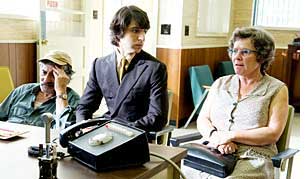 Demetri
Martin stars as Elliot. When he isn't in New York City working as an artist
and as an interior designer, Elliot goes home on the weekends to Bethel
to help out his parents. Mom and Dad (Imelda Staunton and Henry Goodman)
are the proprietors of The El Monaco Resort - a seedy and rundown no star
motel. Even that's polite; if the lodgings were across the pond they would
probably serve the worst pies in London. The rooms' phones don't work, the
air conditioners are empty boxes and towels cost one dollar each. The motel
is on the verge of bankruptcy and Elliot pleads with the bank for another
extension on their loan while his mother, who claims to have walked across
Siberia in hip-deep snow to come to America, makes accusations of anti-Semitism
and pogroms. Demetri
Martin stars as Elliot. When he isn't in New York City working as an artist
and as an interior designer, Elliot goes home on the weekends to Bethel
to help out his parents. Mom and Dad (Imelda Staunton and Henry Goodman)
are the proprietors of The El Monaco Resort - a seedy and rundown no star
motel. Even that's polite; if the lodgings were across the pond they would
probably serve the worst pies in London. The rooms' phones don't work, the
air conditioners are empty boxes and towels cost one dollar each. The motel
is on the verge of bankruptcy and Elliot pleads with the bank for another
extension on their loan while his mother, who claims to have walked across
Siberia in hip-deep snow to come to America, makes accusations of anti-Semitism
and pogroms. |
|
|
|
|
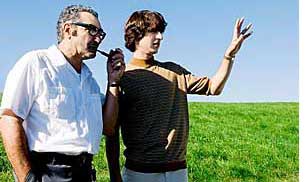 The
rest is history. The El Monaco becomes headquarters for the concert organizers
and everything is turned upside down. The town is in an uproar and prepares
for an invasion of hippies as if it was the first sign of the Apocalypse.
But, aside from a few glimpses into small town xenophobia, this is a film
about dreams and an era when we thought we could change the world. The 60s
was a turbulent time and many people, not just gays, came out of their own
personal closets. The
rest is history. The El Monaco becomes headquarters for the concert organizers
and everything is turned upside down. The town is in an uproar and prepares
for an invasion of hippies as if it was the first sign of the Apocalypse.
But, aside from a few glimpses into small town xenophobia, this is a film
about dreams and an era when we thought we could change the world. The 60s
was a turbulent time and many people, not just gays, came out of their own
personal closets. |
|
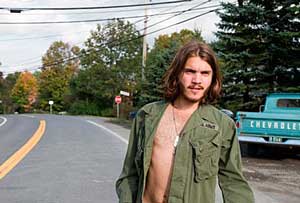 The
film's mood is Dionysian and it's impossible not to get sucked up in the
prevailing joy. A policeman who hoped to bust a few hippie heads winds up
giving the peace sign to concertgoers instead. We see the stage in the distance
and we hear the music in the background, but Taking
Woodstock is more about the people behind the scenes than
it is about the concert itself. The quirky and colorful cast brings this
film to vibrant life. Elliot's parents, especially his mother, are a pair
of curmudgeons whose crusty demeanors crumble during the "three days of
peace and music." The always dependable Eugene
Levy, terrific as Max Yasgur, dispenses folksy charm and the best chocolate
milk in New York State. Emile Hirsch (Milk)
plays a shell-shocked Vietnam vet whose flashbacks subside when he joins
the festival. A nude theatre troupe, residing in Elliot's barn, offers a
"contemporary" take on Chekhov's Three Sisters as shocked parents
drag their children away. The
film's mood is Dionysian and it's impossible not to get sucked up in the
prevailing joy. A policeman who hoped to bust a few hippie heads winds up
giving the peace sign to concertgoers instead. We see the stage in the distance
and we hear the music in the background, but Taking
Woodstock is more about the people behind the scenes than
it is about the concert itself. The quirky and colorful cast brings this
film to vibrant life. Elliot's parents, especially his mother, are a pair
of curmudgeons whose crusty demeanors crumble during the "three days of
peace and music." The always dependable Eugene
Levy, terrific as Max Yasgur, dispenses folksy charm and the best chocolate
milk in New York State. Emile Hirsch (Milk)
plays a shell-shocked Vietnam vet whose flashbacks subside when he joins
the festival. A nude theatre troupe, residing in Elliot's barn, offers a
"contemporary" take on Chekhov's Three Sisters as shocked parents
drag their children away. |
|
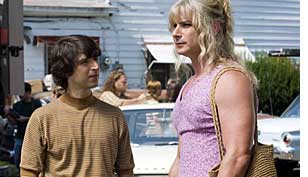 One
of the most unique characters is Vilma, played by Liev Schreiber. Vilma
is a very butch transvestite who was a Marine in Korea and used to date
one of Elliot's boyfriends. He lifts his dress to expose a gun strapped
to his thigh and offers to help with security at the motel. Vilma will also
later help Elliot's parents to chill out with a few hash brownies. Schreiber
is wonderful in the part. Aside from the long blonde wig and the dress,
there is nothing feminine about him and he simply plays the part without
resorting to any stereotypes. It is perhaps the best performance by a straight
actor in such a role since John Lithgow as Roberta (nee Robert) Muldoon
in The World According To Garp (1982). One
of the most unique characters is Vilma, played by Liev Schreiber. Vilma
is a very butch transvestite who was a Marine in Korea and used to date
one of Elliot's boyfriends. He lifts his dress to expose a gun strapped
to his thigh and offers to help with security at the motel. Vilma will also
later help Elliot's parents to chill out with a few hash brownies. Schreiber
is wonderful in the part. Aside from the long blonde wig and the dress,
there is nothing feminine about him and he simply plays the part without
resorting to any stereotypes. It is perhaps the best performance by a straight
actor in such a role since John Lithgow as Roberta (nee Robert) Muldoon
in The World According To Garp (1982). |
|
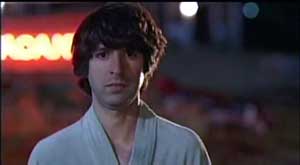 Although
I was disappointed that Elliot's queer backstory is downplayed (we learn
in the book that he was at Stonewall and that he hung out in S&M circles
with Robert Mapplethorpe), this isn't crucial to the main plot and
it is a credit to the director that his identity as a gay man wasn't removed
entirely. Taking Woodstock is
not a coming out film; in fact it fits the dream of Vito Russo who wrote
in The Celluloid Closet that he longed for the day when movie characters
could just be gay without it being the thrust of the plot. Taking
Woodstock is about wonder and innocence, and Elliot gets
to view it through rose tinted glasses. Although
I was disappointed that Elliot's queer backstory is downplayed (we learn
in the book that he was at Stonewall and that he hung out in S&M circles
with Robert Mapplethorpe), this isn't crucial to the main plot and
it is a credit to the director that his identity as a gay man wasn't removed
entirely. Taking Woodstock is
not a coming out film; in fact it fits the dream of Vito Russo who wrote
in The Celluloid Closet that he longed for the day when movie characters
could just be gay without it being the thrust of the plot. Taking
Woodstock is about wonder and innocence, and Elliot gets
to view it through rose tinted glasses. |
|
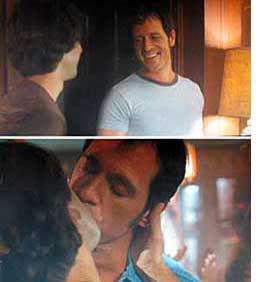 Viewers
who are unaware of Elliot's sexuality at the onset will learn this gradually.
There is a charming scene in which he connects with a young workman named
Paul (Darren Pettie) who is fixing the motel's stereo. They play a Judy
Garland record and talk about her recent death. (Okay, Judy is an obvious
giveaway, but her funeral just helped spark Stonewall a month earlier and
so the reference is timely.) We see the two men together later and then,
when Elliot finds himself in the middle of a hippie dance, Paul reappears
and kisses our stunned hero to the cheers of the frolicking flower children.
Elliot returns the kiss but then turns, worried, to look where his father
was sitting earlier. He is relieved that his father is gone.We aren't treated
to a sexual interlude between them but Paul is seen later sleeping
in Elliot's bed. Viewers
who are unaware of Elliot's sexuality at the onset will learn this gradually.
There is a charming scene in which he connects with a young workman named
Paul (Darren Pettie) who is fixing the motel's stereo. They play a Judy
Garland record and talk about her recent death. (Okay, Judy is an obvious
giveaway, but her funeral just helped spark Stonewall a month earlier and
so the reference is timely.) We see the two men together later and then,
when Elliot finds himself in the middle of a hippie dance, Paul reappears
and kisses our stunned hero to the cheers of the frolicking flower children.
Elliot returns the kiss but then turns, worried, to look where his father
was sitting earlier. He is relieved that his father is gone.We aren't treated
to a sexual interlude between them but Paul is seen later sleeping
in Elliot's bed. |
|
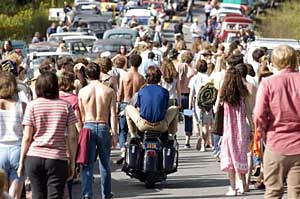 Bethel
is hardly the most progressive beacon on the planet and we've already seen
ample evidence of anti-Semitism from the town's denizens. A sweet little
old lady, who could be Aunt Bee on The Andy Griffith Show, suggests
that they have their own version of the Running of the Bulls and wouldn't
it be funny to see them chase the Jews in their silly hats? Although hippies
seem to the last straw; one can only speculate how they would react if Elliot
wasn't closeted in their town. Then again, there is an ugly moment when
someone who was opposed to the concert painted "Burn Faggot Jews" on the
side of Eliot's family's motel. Bethel
is hardly the most progressive beacon on the planet and we've already seen
ample evidence of anti-Semitism from the town's denizens. A sweet little
old lady, who could be Aunt Bee on The Andy Griffith Show, suggests
that they have their own version of the Running of the Bulls and wouldn't
it be funny to see them chase the Jews in their silly hats? Although hippies
seem to the last straw; one can only speculate how they would react if Elliot
wasn't closeted in their town. Then again, there is an ugly moment when
someone who was opposed to the concert painted "Burn Faggot Jews" on the
side of Eliot's family's motel. |
|
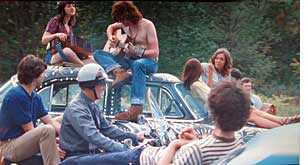 Director
Lee certainly has an affection for the subject and I was reminded, at times,
of Milos Forman's under-rated film version of Hair (1979). The Czech
filmmaker made Hair because, having fled a Communist country, he
was enthralled by the freedom represented by American Counterculture when
he saw the play in 1969. Lee's heart seems to be in the same place. The
Asian director hasn't lost the sense of humor he displayed in The
Wedding Banquet and Taking Woodstock,
like Banquet, is also a superb study in culture clashes. Watch as
Mother screams "No shtuping in he bushes!" at two lovers
enjoying Eden. (Did I mention that there is a surprising amount of nudity
- male too - in this film?) The inspired music choices include The Doors,
Arlo Guthrie, and especially "Wooden Ships" by Crosby, Stills,
Nash and Young. Anyone who has seen Michael Wadleigh's remarkable Woodstock
documentary will be amazed by Lee's re-creation of the milieu. There is
a truly remarkable scene, recalling the famous ten minute tracking shot
of a long traffic jam in Godard's Weekend (1967): Elliot rides on
the back of a policeman's motorcycle through the crowds and backed up traffic
in a shot that lasts almost two minutes in one long, unbroken, camera take. Director
Lee certainly has an affection for the subject and I was reminded, at times,
of Milos Forman's under-rated film version of Hair (1979). The Czech
filmmaker made Hair because, having fled a Communist country, he
was enthralled by the freedom represented by American Counterculture when
he saw the play in 1969. Lee's heart seems to be in the same place. The
Asian director hasn't lost the sense of humor he displayed in The
Wedding Banquet and Taking Woodstock,
like Banquet, is also a superb study in culture clashes. Watch as
Mother screams "No shtuping in he bushes!" at two lovers
enjoying Eden. (Did I mention that there is a surprising amount of nudity
- male too - in this film?) The inspired music choices include The Doors,
Arlo Guthrie, and especially "Wooden Ships" by Crosby, Stills,
Nash and Young. Anyone who has seen Michael Wadleigh's remarkable Woodstock
documentary will be amazed by Lee's re-creation of the milieu. There is
a truly remarkable scene, recalling the famous ten minute tracking shot
of a long traffic jam in Godard's Weekend (1967): Elliot rides on
the back of a policeman's motorcycle through the crowds and backed up traffic
in a shot that lasts almost two minutes in one long, unbroken, camera take. |
|
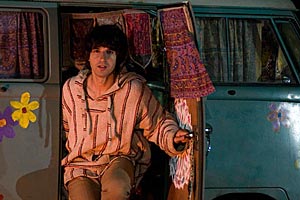 Taking
Woodstock had a hard time finding its audience. Young clubgoers
probably find the idea of Woodstock ancient. Some don't get the 60s and
just hate the word "groovy." And would you believe that I read postings
on imdb.com that griped about all "the gay stuff" in the film? (What, all
ten minutes of it?) Some will undoubtedly complain that we do not get to
see the concert in Taking Woodstock (Rolling
Stone certainly did). Perhaps there were problems with getting rights
to the music. A simpler reason may have been that Elliot never gets to the
concert. During his first foray into the forest, he drops acid with a young
man and woman and enjoys threeway sex in their psychedelic van. They hear
the music from far away and the young man, holding Elliot in his arms, likens
it to "ants making thunder." Everyone knows that there was a massive rainstorm
at Woodstock and, on his next trip, Elliot winds up sliding in the mud with
Billy. Taking
Woodstock had a hard time finding its audience. Young clubgoers
probably find the idea of Woodstock ancient. Some don't get the 60s and
just hate the word "groovy." And would you believe that I read postings
on imdb.com that griped about all "the gay stuff" in the film? (What, all
ten minutes of it?) Some will undoubtedly complain that we do not get to
see the concert in Taking Woodstock (Rolling
Stone certainly did). Perhaps there were problems with getting rights
to the music. A simpler reason may have been that Elliot never gets to the
concert. During his first foray into the forest, he drops acid with a young
man and woman and enjoys threeway sex in their psychedelic van. They hear
the music from far away and the young man, holding Elliot in his arms, likens
it to "ants making thunder." Everyone knows that there was a massive rainstorm
at Woodstock and, on his next trip, Elliot winds up sliding in the mud with
Billy. |
|
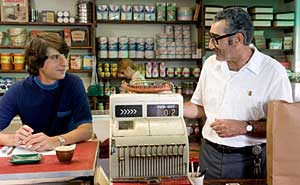 Gay
men and women have made numerous contributions to history and it's interesting
to discover that one of our own is partially responsible for the most iconic
concert of the 20th Century. Others involved in the festival have disputed
a few of Elliot Tiber's claims. Apparently, he didn't really introduce the
promoters to Yasgur for one thing, but he did provide the permit
that made the concert possible. Let the author look back at it with rose
colored glasses if he wishes. Once again, it's "like ants making thunder." Gay
men and women have made numerous contributions to history and it's interesting
to discover that one of our own is partially responsible for the most iconic
concert of the 20th Century. Others involved in the festival have disputed
a few of Elliot Tiber's claims. Apparently, he didn't really introduce the
promoters to Yasgur for one thing, but he did provide the permit
that made the concert possible. Let the author look back at it with rose
colored glasses if he wishes. Once again, it's "like ants making thunder." |
|
|
More
on Ang Lee: Eugene Levy also
appears in: Emile Hirsch also
appears in: Jonathan Groff also
appears in: |